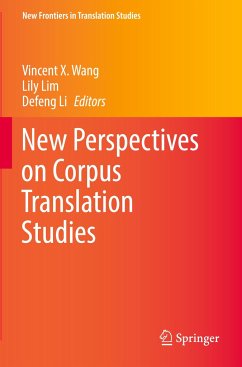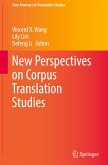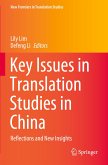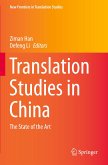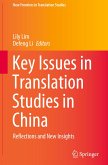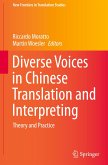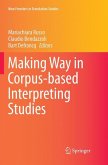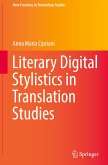New Perspectives on Corpus Translation Studies
Herausgegeben:Wang, Vincent X.; Lim, Lily; Li, Defeng
New Perspectives on Corpus Translation Studies
Herausgegeben:Wang, Vincent X.; Lim, Lily; Li, Defeng
- Broschiertes Buch
- Merkliste
- Auf die Merkliste
- Bewerten Bewerten
- Teilen
- Produkt teilen
- Produkterinnerung
- Produkterinnerung
The book features recent attempts to construct corpora for specific purposes - e.g. multifactorial Dutch (parallel), Geasy Easy Language Corpus (intralingual), HK LegCo interpreting corpus - and showcases sophisticated and innovative corpus analysis methods. It proposes new approaches to address classical themes - i.e. translation pedagogy, translation norms and equivalence, principles of translation - and brings interdisciplinary perspectives - e.g. contrastive linguistics, cognition and metaphor studies - to cast new light. It is a timely reference for the researchers as well as postgraduate…mehr
Andere Kunden interessierten sich auch für
![New Perspectives on Corpus Translation Studies New Perspectives on Corpus Translation Studies]() New Perspectives on Corpus Translation Studies112,99 €
New Perspectives on Corpus Translation Studies112,99 €![Key Issues in Translation Studies in China Key Issues in Translation Studies in China]() Key Issues in Translation Studies in China119,99 €
Key Issues in Translation Studies in China119,99 €![Translation Studies in China Translation Studies in China]() Translation Studies in China104,99 €
Translation Studies in China104,99 €![Key Issues in Translation Studies in China Key Issues in Translation Studies in China]() Key Issues in Translation Studies in China119,99 €
Key Issues in Translation Studies in China119,99 €![Diverse Voices in Chinese Translation and Interpreting Diverse Voices in Chinese Translation and Interpreting]() Diverse Voices in Chinese Translation and Interpreting112,99 €
Diverse Voices in Chinese Translation and Interpreting112,99 €![Making Way in Corpus-based Interpreting Studies Making Way in Corpus-based Interpreting Studies]() Making Way in Corpus-based Interpreting Studies90,99 €
Making Way in Corpus-based Interpreting Studies90,99 €![Literary Digital Stylistics in Translation Studies Literary Digital Stylistics in Translation Studies]() Anna Maria CiprianiLiterary Digital Stylistics in Translation Studies82,99 €
Anna Maria CiprianiLiterary Digital Stylistics in Translation Studies82,99 €-
-
-
The book features recent attempts to construct corpora for specific purposes - e.g. multifactorial Dutch (parallel), Geasy Easy Language Corpus (intralingual), HK LegCo interpreting corpus - and showcases sophisticated and innovative corpus analysis methods. It proposes new approaches to address classical themes - i.e. translation pedagogy, translation norms and equivalence, principles of translation - and brings interdisciplinary perspectives - e.g. contrastive linguistics, cognition and metaphor studies - to cast new light. It is a timely reference for the researchers as well as postgraduate students who are interested in the applications of corpus technology to solving translation and interpreting problems.
Produktdetails
- Produktdetails
- New Frontiers in Translation Studies
- Verlag: Springer / Springer Nature Singapore / Springer, Berlin
- Artikelnr. des Verlages: 978-981-16-4920-2
- 1st edition 2021
- Seitenzahl: 336
- Erscheinungstermin: 13. Oktober 2022
- Englisch
- Abmessung: 235mm x 155mm x 19mm
- Gewicht: 511g
- ISBN-13: 9789811649202
- ISBN-10: 9811649200
- Artikelnr.: 65710893
- Herstellerkennzeichnung Die Herstellerinformationen sind derzeit nicht verfügbar.
- New Frontiers in Translation Studies
- Verlag: Springer / Springer Nature Singapore / Springer, Berlin
- Artikelnr. des Verlages: 978-981-16-4920-2
- 1st edition 2021
- Seitenzahl: 336
- Erscheinungstermin: 13. Oktober 2022
- Englisch
- Abmessung: 235mm x 155mm x 19mm
- Gewicht: 511g
- ISBN-13: 9789811649202
- ISBN-10: 9811649200
- Artikelnr.: 65710893
- Herstellerkennzeichnung Die Herstellerinformationen sind derzeit nicht verfügbar.
Vincent X. Wang is an associate professor of the University of Macau and a NAATI-certified translator and received his M.A. and Ph.D. in Applied Linguistics from the University of Queensland (2006). His research interests are in interlanguage pragmatics, corpus-based contrastive language studies, and discourse and pragmatics in translation. He published journal articles in Sage Open, Target, Journal of Language, Literature and Culture, TESOL-related periodicals, book chapters with Springer, Routledge and Brill, conference papers with PACLIC and CLSW, and a monograph Making Requests by Chinese EFL Learners (John Benjamins). His recent research draws on big data and corpus linguistics methodologies to investigate language properties, discourse, and the use of conceptual metaphors in social events such as COVID-19. Lily Lim holds a Ph.D. and an MA in applied linguistics (University of Queensland), a master's degree in software engineering (University of Macau), Certificate of Training Techniques (Escolas da Armada, Portugal) and Certificate of Chinese-Portuguese Interpreting Training (Comissão Europeia). She has been both a practising interpreting and trainer for conference interpreters for two decades. She is currently an associate professor and a coordinator of the Chinese-English Translation and Interpretation Program at the School of Languages and Translation, Macao Polytechnic Institute. Her recent research covers computer-assisted interpreter and translator training and corpus-based language studies. She has published papers in ReCALL, Babel and The Interpreter and Translator Trainer; chapters with Springer, Rodopi, Routledge, and Cambridge Scholars Publishing; and an edited book with Springer and a monograph with Bookman. Defeng Li is a professor of translation studies and a director of the Centre forStudies of Translation, Interpreting and Cognition (CSTIC) at the University of Macau. Prior to his current appointment, he served as a chair of the Centre for Translation Studies and a reader in Translation Studies at SOAS, University of London; a director of the MA in Translation and an associate professor at the Chinese University of Hong Kong; a dean and a chair professor at Shandong University; and a (visiting) chair professor at Shanghai Jiao Tong University. He is currently a president of World Interpreter and Translator Training Association (WITTA). He has researched and published extensively in the fields of cognitive translation studies, corpus-assisted translation studies, curriculum development in translator training, research methods in translation studies, professional translation (e.g., business, journalistic, and legal translation), as well as second language education.
Introduction.- Trends and New Directions.- New Developments in Corpus Translation Studies.- Using Corpora in Translation Pedagogy.- New Trends in Corpus-based Translator's Style Studies.- Translation Norms and Styles.- The Dutch Parallel Corpus Revisited.- On the Importance of Multifactorial Approaches in Corpus-Based Translation Studies.- Probing a Two-Way Parallel T&I Corpus for the Lexical Choices of Translators and Interpreters.- Translationese and Register Variation in English-to-Russian Professional Translation.- A Corpus-based Lexical Study of the Four English Translations of Louis Cha's Martial Arts Fiction.- Cognition and Translation Equivalents.- Cross-cultural and Multi-brain Perspectives.- Evidence and Significance of Metonymic Chains in Chinese/English Translation.- Mind the Source Data Translation Equivalents and Translation Stimuli from Parallel Corpora.- A Corpus-based Examination of the Translation of the Suffix -ism into Chinese.- An Intralingual Parallel Corpus of Translations into German Easy Language.- Examining Prefix and Its Renditions in Chinese.- Making Sense with Comparable and Parallel Corpora.
Introduction.- Trends and New Directions.- New Developments in Corpus Translation Studies.- Using Corpora in Translation Pedagogy.- New Trends in Corpus-based Translator's Style Studies.- Translation Norms and Styles.- The Dutch Parallel Corpus Revisited.- On the Importance of Multifactorial Approaches in Corpus-Based Translation Studies.- Probing a Two-Way Parallel T&I Corpus for the Lexical Choices of Translators and Interpreters.- Translationese and Register Variation in English-to-Russian Professional Translation.- A Corpus-based Lexical Study of the Four English Translations of Louis Cha's Martial Arts Fiction.- Cognition and Translation Equivalents.- Cross-cultural and Multi-brain Perspectives.- Evidence and Significance of Metonymic Chains in Chinese/English Translation.- Mind the Source Data Translation Equivalents and Translation Stimuli from Parallel Corpora.- A Corpus-based Examination of the Translation of the Suffix -ism into Chinese.- An Intralingual Parallel Corpus of Translations into German Easy Language.- Examining Prefix and Its Renditions in Chinese.- Making Sense with Comparable and Parallel Corpora.

